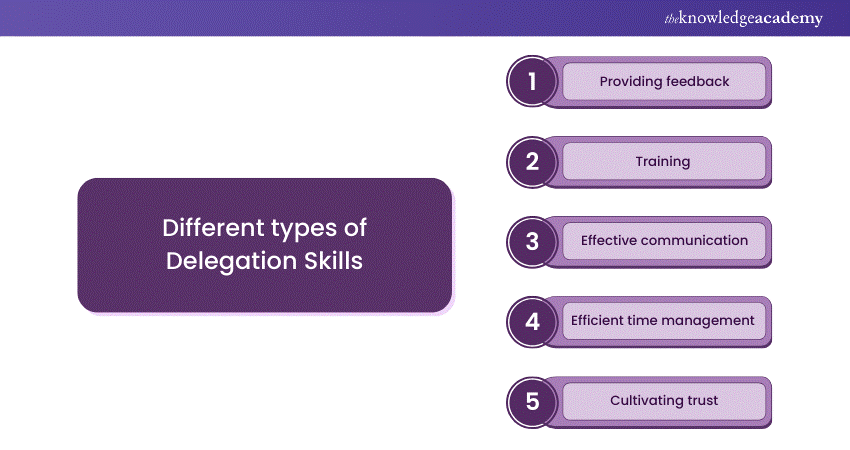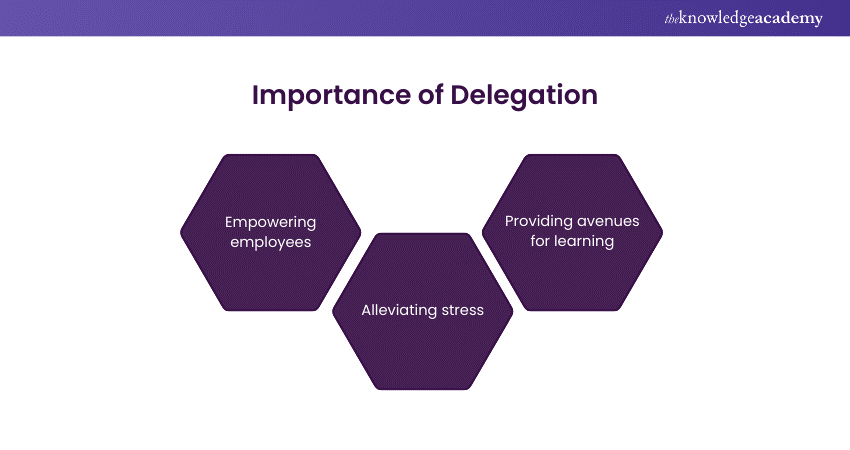We may not have the course you’re looking for. If you enquire or give us a call on +48 221041849 and speak to our training experts, we may still be able to help with your training requirements.
Training Outcomes Within Your Budget!
We ensure quality, budget-alignment, and timely delivery by our expert instructors.

Delegation is one of the main abilities that makes Leadership effective. It consists of Delegation which implies focus on strategic issues and empowering and engaging team members to seek growth and contribute. In this blog, we will examine the Delegation Skills for Effective Leadership, the types of Delegation, the importance of Delegation and the examples of efficient Delegation methods.
Table of Contents
1) What are Delegation Skills?
2) Different types of Delegation Skills
3) Importance of Delegation
4) Examples of Delegation techniques
5) Conclusion
What are Delegation Skills?
Delegation Skills encompass the ability to effectively assign tasks, communicate expectations, and provide support to ensure successful completion. It involves understanding each team member's strengths, weaknesses, and developmental needs to allocate tasks accordingly. Effective Delegation also involves setting clear objectives, establishing timelines, and offering guidance when needed.
Different types of Delegation Skills
The term Delegation Skills refers to the collection of different approaches, which leaders may use to good effect to ensure that the tasks are distributed, and the team gets empowered. Delegation through different skills assigns each of the tasks uniquely for the smooth implementation of the matters within the organisation.

1) Providing feedback
Top leaders are proud of giving their subordinates proper evaluation to their work. It entails sharing knowledge, congratulating workers, and picking out weak point synergy. By providing feedback, leaders help their teammates live up to their potential and create a learning environment where improvement never ends.
2) Training
Delegation more often than not calls for leaders to ensure that their team members are well trained and well equipped with the required skills and expertise. This is executed by training the workers to do the various functions and delegated tasks effectively.
Training may be workshops, seminars, on-the-job training, or one-on-one mentorship programs based on the needs of the team's members.
Improve your Leadership Skills through our Leadership Skills Course.
3) Effective communication
Effective communication style becomes of utmost importance in Delegation. Managers need to ensure that they are effectively communicating the task objectives, deadlines, and priorities so that workers understand the expectations and their role in the team.
Effective communication needs active listening, as team leaders with this skill can solve any problems or questions that team members have at once.
4) Efficient Time Management
To delegate is to manage time so that all important tasks can be assigned priority and executed in the most efficient manner. This is the ability to prioritise the tasks, considering the urgency and importance, and delegating accordingly to the given deadlines without compromising the quality.
Ensuring proper Time Management helps leaders focus on their strategic mission, delegating routine tasks to their teammates.
5) Cultivating trust
Trust is the building block of Delegation as it is successful. The leaders are to enhance trust among the team members by being confident in their abilities, open in their communication and fulfilling their promises. Trust-building contributes to a favourable work culture in which team members feel that they are respected and that they are given a chance to perform their duties with a sense of ownership.
In summary, different types of Delegation Skills, including providing feedback, training, effective communication, efficient Time Management, and cultivating trust, are essential for Effective Leadership. By mastering these skills, leaders can delegate tasks effectively, empower their teams, and drive organisational success.
Importance of Delegation
Delegation plays a pivotal role in Effective Leadership and organisational success, offering many benefits that contribute to improved efficiency, employee empowerment, and overall performance. Understanding the significance of Delegation is crucial for leaders as they navigate the complexities of managing teams and achieving strategic objectives.

1) Empowering employees
Delegation confers power to the employees by asking them to take on obligations and to be the deciders. A sense of belonging and appreciation for their efforts encourages teams when members are given the freedom to attend to tasks and fulfil assignments.
The staff who feel empowered are more involved, inspired, and dedicated to implementing organisational strategy. So, they deliver better performance and innovation.
2) Alleviating stress
Through effective Delegation, leaders get to distribute the workload equally among their team members in such a way that one person does not get overworked therefore reducing the stress levels. Sharing managerial duties with other leaders lets them direct their time, effort, and attention to urgent matters, strategery, and crucial decision-making.
Delegation allows leaders to keep a high staff morale which includes their work-life balance and not experiencing excessive stress effects on their health and output.
Improve your decision making through our Decision Making Skills Training.
3) Providing avenues for learning
Delegation not only equips staff members with fundamentally new abilities but also offers them a chance to enhance their intellectual horizons and become better professionals. Through setting difficult tasks and projects, leaders stimulate the team members´ training and development of their skills.
Delegating responsibilities is a process whereby personnel move beyond their comfort zones, develop self-confidence, and acquire expertise that comes through and helps career development.
Examples of Delegation techniques
The Delegation techniques comprise many approaches that leaders use to assign their tasks, empower their team and focus on maximising the organisation's effectiveness. Such attributes play a role in helping a leader select the best method of Delegation specific to the situation and the objective, thus ensuring that the work is done up to the standards.
1) Delegating research for decision-making
Leadership usually means that specific projects are carried out to find out the relevant research data for well-considered decision. This method puts research projects on people or groups, clearly giving them the area, objectives, and planned outcomes.
In research, we are accountable for detailed exploration, data processing, and providing reports that will aid in making strategic decisions. Through assigning research jobs leaders take advantage of the intellectual strength of their employees and allocate more time to the development of strategies and tactical applications.
2) Delegating with intervention rights
For cases when work is more complex or has a higher stake, leaders may use intervention rights in the Delegation process to retain control over crucial decisions. Such a method indicates assigning duties to team members while being ready to intervene if the need arises.
Leaders define distinct milestones and regularly monitor progress in their own presence to ensure that all is on track and help by providing advice or assistance wherever necessary. Entrusting a team with intervention rights validates the sense of ownership of the team members while keeping leaders in the know and on top of important matters.
3) Delegating with reporting outcomes
The other application of the Delegation is delegating responsibilities with the expected monitoring. Leaders designate what message needs to be delivered, how often, and in what medium.
The teammates will give periodic reports on their progress, indicating every issue or hurdle they come across, and present the result at the end of a task should they encounter any challenges.
This approach facilitates accountability, transparency, and innovative communication within the team, making it easy for leaders to keep an eye on progress, detect issues, and provide help when required.
Conclusion
Mastering Delegation Skills is indispensable for Effective Leadership. By understanding the Delegation Skills for Effective Leadership, recognising its importance, and implementing diverse Delegation techniques, leaders can empower their teams, alleviate stress, foster growth, and ultimately achieve organisational goals with efficiency and effectiveness.
Improve your Leadership presence through our Executive Leadership Presence Training.
Frequently Asked Questions

The four C's of Delegation are Clarity, Capability, Communication, and Control. They represent the key elements for effective task Delegation: clear definition of tasks, alignment with team members' skills, transparent communication, and maintaining oversight throughout the process.

The four phases of Delegation are as follows:
1) Assignment
2) Authority
3) Accountability
4) Feedback

The Knowledge Academy takes global learning to new heights, offering over 30,000 online courses across 490+ locations in 220 countries. This expansive reach ensures accessibility and convenience for learners worldwide.
Alongside our diverse Online Course Catalogue, encompassing 17 major categories, we go the extra mile by providing a plethora of free educational Online Resources like News updates, Blogs, videos, webinars, and interview questions. Tailoring learning experiences further, professionals can maximise value with customisable Course Bundles of TKA.

The Knowledge Academy’s Knowledge Pass, a prepaid voucher, adds another layer of flexibility, allowing course bookings over a 12-month period. Join us on a journey where education knows no bounds.

The Knowledge Academy offers various Leadership Courses, including Leadership Skills Course, Introduction to Supervising a Team Course and Managing Innovation Course. These courses cater to different skill levels, providing comprehensive insights into How to Develop a Strong Leadership Pipeline?
Our Business Skills Blogs cover a range of topics offering valuable resources, best practices, and industry insights. Whether you are a beginner or looking to advance your Business Improvement skills, The Knowledge Academy's diverse courses and informative blogs have you covered.
Upcoming Batches & Dates
Date








 Top Rated Course
Top Rated Course



 If you wish to make any changes to your course, please
If you wish to make any changes to your course, please


